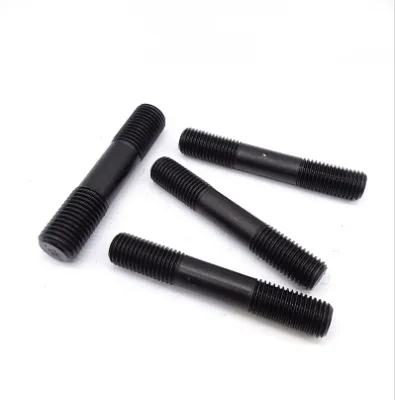

The Importance of Black Lock Nuts in Industry
Mai . 19, 2025 14:13 De volta à lista
The Importance of Black Lock Nuts in Industry
In modern industrial systems, mechanical connections play a crucial role. Bolt connection, as a common and efficient connection method, is widely used in the assembly of various equipment and structures. However, under complex working conditions such as vibration, impact, and high temperature, bolt connections are prone to loosening, leading to safety hazards and performance degradation. In order to solve this problem, various anti loosening technologies have emerged, among which Black Lock Nuts play a crucial role in the industrial field due to their reliability, economy, and applicability.

Hex nut, Medium carbon steel is usually made using quenching and tempering processes, and is treated with phosphating or blackening to improve its corrosion resistance. The core anti loosening principle is to use a special structural design to generate additional friction or mechanical locking during the tightening process, thereby preventing the nut from loosening on its own under external factors. This structural design can take various forms such as nylon ring locking, metal elastic deformation locking, or special thread structure locking.
Ensuring security is the core value of Black Lock Nuts
The safety of bolted connections is crucial in key fields such as bridges, rail transit, and aerospace. Once the bolts become loose, it may lead to structural failure, causing serious economic losses and even casualties. Black Lock Nutslock nut effectively reduces the risk of loose bolt connections by providing reliable anti loosening performance, thereby ensuring the stable operation of equipment and the safety of personnel.
Black Lock Nuts improve device reliability and lifespan
In the fields of heavy machinery, mining equipment, etc., equipment is exposed to high loads and severe vibrations for a long time. Ordinary bolt connections are prone to loosening, leading to decreased equipment performance, increased maintenance frequency, and even shortened equipment lifespan. The anti loosening effect of parafusos de móveis e porcas de barril can effectively reduce failures caused by loose bolts, thereby extending the service life of equipment and improving production efficiency.
Black Lock Nuts reduce maintenance costs
Conventional bolted connections require regular inspection and tightening during operation, which increases maintenance costs and downtime. The use of parafusos e porcas sextavadas can significantly reduce the possibility of bolt loosening, lower maintenance frequency, thereby saving maintenance costs and improving equipment availability.
Black Lock Nuts come in a wide variety, suitable for different working conditions and materials
Lock nuts of different materials, specifications, and anti loosening principles can be selected according to actual needs to meet specific application scenarios. For example, high-temperature resistant locking nuts are suitable for bolted connections in high-temperature environments, while corrosion-resistant locking nuts are suitable for bolted connections in humid or corrosive environments.
In summary, Black Lock Nuts play an irreplaceable role in ensuring safety, improving equipment reliability, and reducing maintenance costs due to their reliable anti loosening performance, wide applicability, and economic advantages. As an important mechanical connecting component, Black Lock Nuts play a pivotal role in modern industry, providing a solid foundation for the development of various industries. With the continuous advancement of industrial technology, the design and manufacturing process of Black Lock Nuts will also be continuously improved to meet the growing industrial demand.
Black Lock Nuts FAQs
What is Black Lock Nut?
Black Lock Nut is a type of nut with anti loosening function, usually treated with black oxidation on the surface (rust proof), and equipped with locking structures (such as nylon rings, metal deformation teeth, etc.) to prevent loosening under vibration or dynamic loads. Common types include:
Nyloc Nut
Metal Lock Nut (metal lock nut, such as all metal locking teeth)
What is the anti loosening principle of Black Lock Nut?
According to different types, the anti loosening principle can be divided into:
Nylon locking: The nut is embedded with a nylon ring, and when tightened, the friction between the nylon and the bolt thread creates resistance to prevent retraction.
Metal locking: The nut has metal deformation teeth at the top or bottom, which elastically deform and bite the threads after being tightened.
Double nut structure: Locking is achieved by squeezing two nuts against each other (black coating for anti-corrosion).
What scenarios is Black Lock Nut suitable for?
High vibration environment: automotive engines, mechanical equipment, rail transit.
Occasions that require repeated disassembly and assembly: Nylon lock nuts can be reused (but the nylon ring will gradually wear out).
Anti corrosion requirements: Black oxidation treatment provides basic rust prevention, suitable for indoor or dry environments.
Can Black Lock Nut replace regular nuts and washers?
Alternative: The locking nut comes with anti loosening function and does not require additional spring washers.
However, it should be noted that:
Nylon locking nuts are not resistant to high temperatures (usually<120 ℃).
Metal locking nuts may cause slight wear on bolt threads.
How to choose the specifications of Black Lock Nut?
The following parameters need to be matched:
Thread specifications: such as M6, M8 (metric), or 1/4 "20 (imperial).
Anti loosening type:
Nylon lock (Nyloc) - universal type.
All metal locking (such as Stover Nut) - resistant to high temperatures.
Strength level: such as level 8, level 10 (corresponding to bolt performance level).
Surface treatment: Black oxidation is only suitable for mild corrosion protection. Galvanizing or Dacromet is recommended for humid environments.
Últimas notícias
-
The Versatility of Threaded Rods for Your Projects
NotíciasJun.11,2025
-
The Quality Hex Head Self Tapping Screws for Every Project
NotíciasJun.11,2025
-
The Essential Fasteners for Every Project
NotíciasJun.11,2025
-
High-Quality Flange Nuts for Your Next Project
NotíciasJun.11,2025
-
Explore the Versatility of T Bolts for Your Projects
NotíciasJun.11,2025
-
Explore the Best Slotted Channels for Your Projects
NotíciasJun.11,2025

